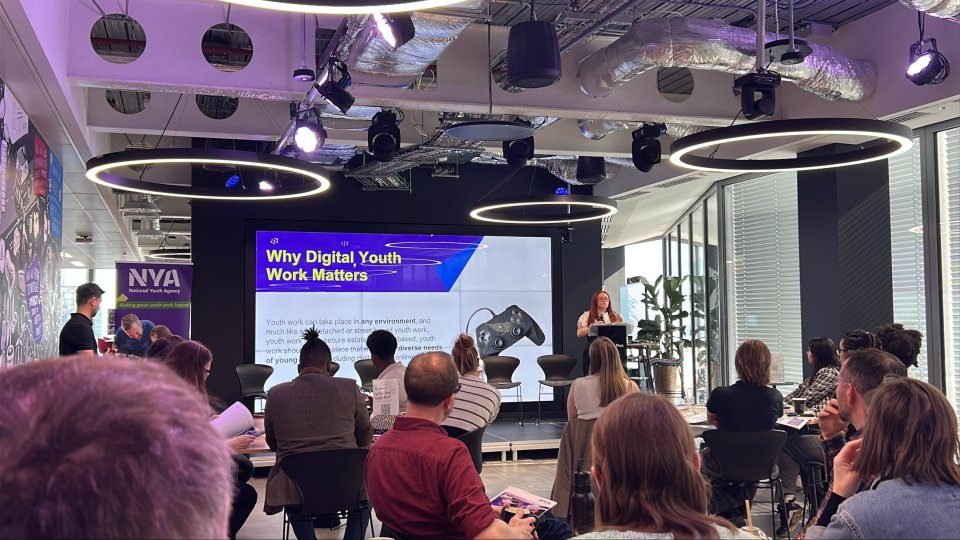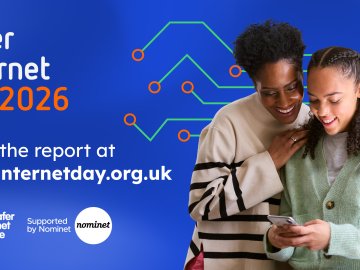SWGfL were pleased to attend the launch of the National Youth Agency’s (NYA) new Digital Youth Work Standards, funded by the Department for Culture, Media and Sport (DCMS). Held at Tata Consultancy Services’ (TCS) Pace Port in London, this event brought together key stakeholders, youth work pioneers, and online safety experts to celebrate a crucial advancement in digital youth work.
The newly launched Digital Youth Work Standards set out a quality framework designed to enhance digital youth work practices across the sector. As an organisation dedicated to empowering young people and those who support them to stay safe online, we recognise the critical need for such a framework particularly within this area. This initiative comes in response to findings from NYA’s research, which highlight significant gaps in digital skills and confidence among youth workers.
Key Findings Underscore the Need for More Training
The research revealed that only 24% of youth workers have received digital-specific youth work training, and just 34% feel confident in their ability to deliver digital youth work. This highlights that while young people are increasingly immersed in online spaces, those tasked with supporting them often feel ill-equipped to engage in these environments effectively.
Despite the fact that 67% of respondents claim to understand digital youth work, there remains no consistent definition of what it entails. Additionally, many still perceive digital youth work as being less impactful than traditional youth work, with 53% of youth workers sharing this view.
However, the reality is that online engagement is an essential part of youth work today. With 99% of 12-15-year-olds regularly online (Ofcom media literacy report 2024), online platforms offer vital opportunities to reach young people where they feel most comfortable.
Addressing Barriers Towards Digital Youth Work
A key barrier identified in the research is fear of the unknown—with 36% of youth workers citing concerns over digital risks and complexity. This highlights the urgent need for clearer guidance, training, and best practice frameworks to boost confidence in delivering safe and effective digital youth work. The Digital Youth Work Standards serve as a comprehensive roadmap to address these concerns, ensuring that youth workers can harness digital tools while maintaining strong safeguarding measures.
The standards also acknowledge the barriers that some young people face in accessing face-to-face youth work. Young people experiencing mental health challenges, neurodiverse individuals, and those who are persistently absent from school may find online spaces more accessible and inclusive. The Standards emphasise how digital platforms can complement and enhance traditional youth work rather than replace it.
Training and Education
SWGfL recognises the importance of equipping youth workers with the knowledge, tools, and confidence to navigate digital landscapes.
Through our work with the UK Safer Internet Centre and various online safety initiatives, we are actively involved in training youth workers, educators, and professionals understand the risks and opportunities associated with digital engagement.
We are soon to be hosting expert-led online safety clinics, covering critical topics such as intimate image abuse, AI in education, and online safety for SEND communities. These interactive sessions provide practical guidance and expert insights to professionals supporting young people and vulnerable groups. Sessions include understanding and combating intimate image abuse (3rd April), the role of AI in education (9th April), and tailored online safety strategies for SEND learners (8th May & 9th July). With limited spaces available, professionals are encouraged to register early to benefit from these essential discussions.
Boris Radanovic (Head of Partnerships at SWGfL) said ‘’We encourage youth workers, organisations, and policymakers to engage with the Digital Youth Work Standards and explore how they can integrate these practices into their work. By working together and engaging with regular training and education, we can ensure that digital youth work is not only recognised but embraced as a core component of youth services moving forward.’’
Bex Pink (National Digital Innovation Lead at NYA) said ‘’Youth work is a constantly evolving field, and digital youth work presents a crucial opportunity to support young people who may not otherwise access in-person services. While the digital space offers vast potential, it is equally important to embed digital awareness as a key topic in every environment where youth work takes place. This ensures our work acknowledges the significant offline impact of the online world on young lives.
Youth workers are uniquely placed as skilled professionals who, with the right training and support, can help young people navigate the complexities of the digital landscape. Through our vital partnership with SWGfL, we are committed to equipping youth workers with the skills, knowledge, and confidence to engage young people online and strengthen their digital literacy.’’






